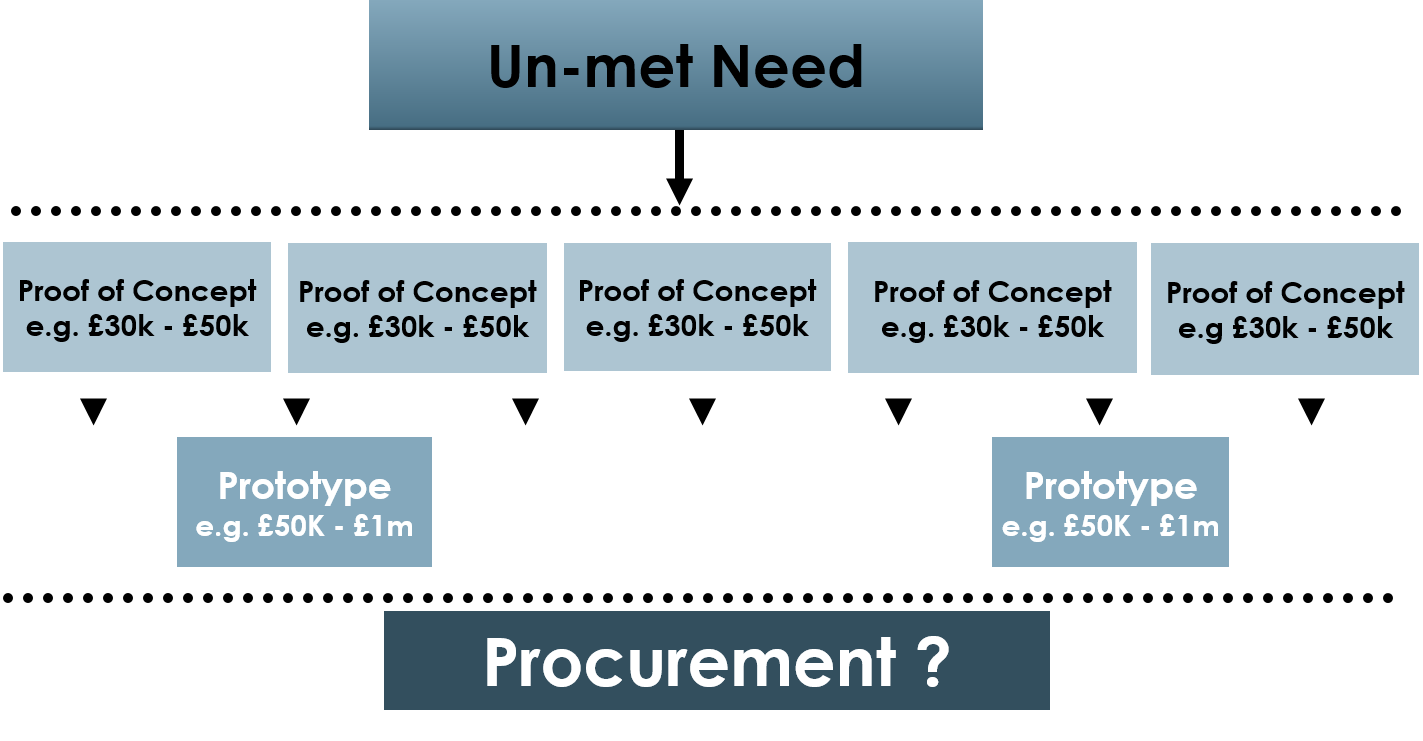Information for Businesses
Who is eligible?
SBRI projects are open to all businesses (sole traders, partnerships or limited companies) either on their own or in conjunction with another business, charity or academic institution.
How SBRI works
SBRI projects usually involve a first short (typically 6-9 months) proof of concept phase. Multiple suppliers will work with the public sector challenge owner, and if those proofs of concept are promising, a further development phase will be used to take forward the most promising solutions.

What businesses say
Since the SBRI launched in Northern Ireland in 2009, more than 50 companies have led on SBRI projects across seven government departments, working on more than 30 projects. Many have also collaborated with other organisations including charities and community groups, as well as universities and research organisations.
Feedback from suppliers show that most value the opportunity to work with the public sector, with many seeing benefits in increased knowledge and skills of working with the public sector, as well as the opportunity to enter new markets and grow their businesses.
How to apply
All SBRI projects are advertised on eTendersNI and are open to all. There are no prequalification criteria – SBRI projects are open to established companies as well as new start-ups. If you have an idea that you think would address the public sector challenge set out in the invitation to tender – then apply.
Frequently asked questions
SBRI provides innovative solutions to challenges faced by the public sector, leading to better public services and improved efficiency and effectiveness. It supports economic growth and enables the development of innovative products and services through the public procurement of R&D. It generates new business opportunities for companies, provides businesses with a route to market for their ideas and bridges the seed funding gap experienced by many early stage companies. SBRI is a simple structured process. Typically, competitions are structured in two phases.
Phase I proposals concentrate on that research and development which will significantly contribute to proving the scientific, technical and commercial feasibility of the proposed project.
Any organisation based in the European Union (EU) that can demonstrate a credible and practical route to market can submit an application.
Contracts will be awarded only to individual organisations. However, applicants may identify components of the work which they wish to subcontract and may also employ specialist consultants or advisers if they believe this will increase the chances of the project being successful. Any work may be subcontracted, but this is the responsibility of the main contractor.
Yes, but contracts must be awarded to legal entities.
Universities and other non-commercial organisations may apply, however, they must demonstrate a credible and practical route to market, i.e., the application must include a plan to commercialise the results.
Full Economic Cost calculations are not relevant in this context. SBRI is a competitive procurement mechanism and tenders will be submitted by a variety of organisations. Whatever calculation you use to arrive at your tender price your application will be assessed against bids from other organisations.
You should calculate your tender price bearing this in mind and that your proposal will be assessed as to whether it reflects a fair market value. You are entitled to include overheads.
VAT is the responsibility of the invoicing business, and it is required that applications will list total costs exclusive and inclusive of VAT. Should you consider you are VAT exempt then you may quote without VAT but you will not at a later date be able to increase invoice values to cover VAT.
An element of overheads may be included in project costs, however such an element must be realistic. Assessors will consider financial costs in terms of ‘value for money’ at the assessment stage.
Projects showing costs that are considered unreasonable will be rejected on these grounds.
Registered charities may apply via their trading company, just as for other non-commercial organisations, they must demonstrate a credible and practical route to market, i.e. the application must include a plan to commercialise the results.
The scope of the project is described in the Competition Brief (Document 02: Competition brief), along with contact details for queries.
The process to submit an application is described in the Invitation to Tender (Document 01: Invitation to Tender), along with contact details for queries.
Yes. However, each application that you wish to submit will require a separate registration.
The deadline for tender submissions is clearly set out in the Invitation to Tender (Document 01: Invitation to Tender). Please note that late submissions cannot be considered.
Proposals will be selected using the methodology set out in the Invitation to Tender (Document 01: Invitation to Tender) by an expert group of selected assessors and a final assessment panel.
All applicants will be informed shortly after the assessments have been concluded.
Ownership of and rights to intellectual property are covered by clauses in the contract. Typically, intellectual property rights are retained by the applicant, although certain rights of usage may be applied by the funding authority including royalty-free, non-exclusive licence rights and the right to require licenses to third parties, at a fair market price.
No. Where Public Authorities buy R&D from organisations at a fair market price, not for their exclusive use and where the competition is advertised in an open market, there is no advantage and consequently no element of State Aid.
SBRI competitions have a three phase structure:
- Phase 1 is intended to show the technical feasibility and commercial viability of the proposed concept;
- Phase 2 is intended to develop and evaluate prototypes or demonstrators from the more promising technologies identified in Phase 1; and
- Phase 3 allows for a period of extended testing for the most promising potential solutions, where this is desirable.
At Phase I, a number of suppliers are selected by an open competition process to develop their solutions to the specific needs identified by the contracting authority. Development work within Phase 1 is funded up to 100% of justified cost or to a stated maximum value.
At the end of Phase 1, all or a subset only of the suppliers in Phase 1 may be selected to proceed to later phases at the discretion of the tendering organisation’s discretion, based on agreed objective selection criteria and budget availability.
At the conclusion of the SBRI contract, or at any other time, the contracting authority may decide to procure the solution(s) developed or similar solution(s) from other providers – but there is no obligation to do so. If a solution is to be procured, this will constitute a separate competition under normal public procurement rules and other potential suppliers on the open market will be free to compete for the business.
Please refer to the contact guidance set out in the Invitation to Tender (Document 01: Invitation to Tender).
Latest Funding Competitions
-
Augment the City Challenge
Belfast City Council Belfast City Council’s City Innovation Office and funded by theNorthern Ireland -
All-Island Female Entrepreneurs Pitching Competition
Women in Business NINorthern Ireland -
Feasibility studies for AI solutions: Series 2
Innovate UKEngland -
Help to Grow: Digital
BEISUK
Get in touch
Got a question about SBRIs? Whether you are a business or a public sector organisation, use this form to get in touch with us.
Our expert team is highly experienced in dealing with all aspects of SBRIs and can provide you with the advice you need.

Sign up for our briefing!
Get all the latest news, funding opportunities and events for the Northern Ireland science and technology sector.
SBRI Competition – Increasing household recycling practice through the novel use of persuasive technologies
A new competition, funded by the Small Business Research Initiative (SBRI) and focused on increasing household recycling practice through the novel use of persuasive technologies, has [...]
Expression of Interest open for SBRI
The Expression of Interest is now open for the latest round of the Small Business Research Initiative (SBRI|NI), a fully funded programme from the Department [...]
New SBRI competition aims to identify practical solutions for livestock waste
A new competition, funded by the Small Business Research Initiative (SBRI) and focused on delivering a sustainable Utilisation of Livestock Slurry, has been launched by [...]



